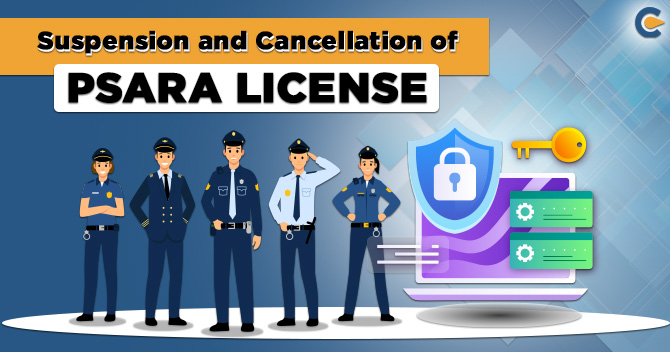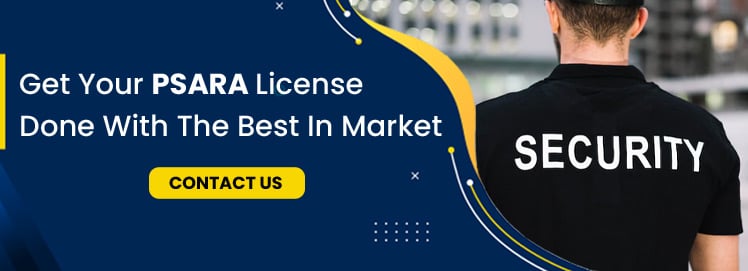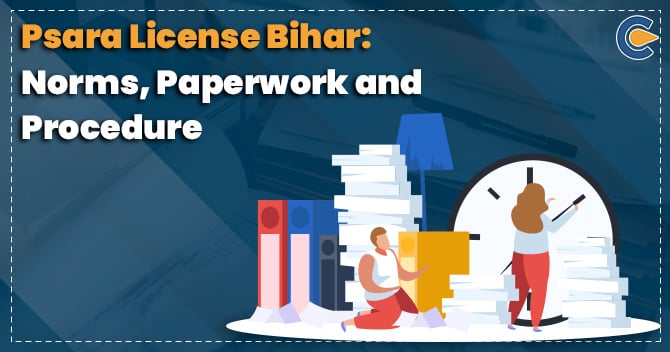In the wake of this new economic reality and to ensure that the government resources are focused towards better delivery towards internal security, private security agencies can serve as viable alternative perform to traditional police performing non-critical security functions. PSARA License is necessarily required by any person before starting a private security business in India. However, the license can be cancelled or suspended by the authority on violating the norms of the provisions of the PSARA Act or on non-compliance of the conditions as specified. This article is to focus upon cancellation of PSARA license.
Importance of holding PSARA License
A Private Security Agency Services (PSA) provides the services of armed and unarmed security guards for the protection. These agencies helps in security to the world by providing services like patrol services, bodyguard, guard dog, parking security etc. Private security agencies can provide security services to private and government companies, restaurant, guesthouses and hotels, housing societies, private bungalows etc. All the PSAs are registered and regulated under Private Security Regulation Act, 2005 (PASARA).
The Private Security Agencies not only provide security services but also provides the training to security guards. However, Section 4 of the Act clearly states that no person will carry on or commence the business unless he holds a license issued under this PSARA act to have private security agency.Therefore, it is important to have PSARA license to run a private security agency.
Suspension and Cancellation of PSARA license
1. Under Section 13 (1), the Controlling Authority has an authority to do cancellation of PSARAlicense, on any one or more of the following grounds which are:
- In case that the license has been obtained by way ofmisrepresentation or suppression of material facts
- If the license holder has used false documents or photographs for the license
- If the license holder has violated any of the provisions given under this Act or the rules made thereunder. Also if he has breachedany of the conditions of the license
- In case if the license holder has misused informationthat has been obtained by him during the discharge of hisduties, as the private security agency to any industrial or business undertaking or a company or anyother person.
- If the license holder by using any letter-head, advertisement or any other printed matter for illegal use. Also if he fraudsin any other manner by representing that the private security agency is an instrumentality of theGovernment or has been using a name different from that for which license hasbeen granted
- If the license holder has been impersonating or permitting or aiding or abetting anybody to impersonate as a public servant
- If the license holder has willfully failed or refused to render the services agreed to any person
- If the license holder has done any act which is in violation of a court order or an order of alawful authority. Also if he has been advising, encouraging or assisting any person to violate any suchpublic order
- If the license holder has been violated the provisions of the Acts given in the Schedule which maybe modified by the Central Government, by notification in the Official Gazette
- If the license holder has done any act which poses a threat to national security, or did not provide assistance to the police or other authority in the discharge of its duties or acted in a manner prejudicial to national security or public order or law and order.
- In case the private security agency had failed to commence its activities or to engage a supervisor within the specified time period
- In case there have been repeated instances when the private security guard or guards provided bythe private security agency are failed to act as follows:


2. The Controlling Authority can order for cancellation of PSARA license after recording the reasons in writing. The authority has to satisfy that pending the question of cancellation of PSARA license has been made on of the grounds provided in sub-section (1). When it is necessary to do so, the Controlling Authority can, by making order in writing, can also suspend the operation of the license for the period of not exceeding thirty days as may be specified in the order. The license holder requires showing cause within fifteen days from the date of issue of suspension order, as to why the suspension of the license should not be extended till the determination of the question of cancellation.
3. Every order of suspending or cancelling of a license must be in writing and must specify the reasons for such suspension or cancellation of PSARA license. The copy of such must be communicated to the affected person.
4. No order of cancellation of PSARA licensemust beunder sub-section (1) unless the concerned personhas been given a reasonable opportunity of being heard.
Conditions for Suspension and Cancellation of PSARA license
The two conditions must be compulsory fulfilled up on the cancellation of PSARA License.
Those are as follows:-
- The license granted under this Act must not be cancelled or suspended unless the holder of a PSARA license has been given a reasonable opportunity of being heard. He can show cause after giving due service of notice, why his license must not be cancelled or suspended.
- The opportunity for showing cause and of being heard must not be given when the license is suspended temporarily pending for an enquiry against the holder of the license for contravention of any of the grounds as mentioned in section 13(1) of the Act or of any of the conditions of the license granted to him.
Read our article: Punishment under PSARA Act for Private Security Agencies
Appeals made on Suspension and Cancellation of PSARA License
- Any person who is aggrieved by an order of the Controlling Authority for the suspension of license under sub-section (2) of section 13, or cancellation of license under sub-section (1) of the section 13 has the two remedies.
Those are as follows:-


- Every appeal when under sub-section (1) must be made in such form as may be prescribed and also be accompanied with a copy of the order against which appeal is made.
- Before disposing of an appeal, the State Government has to give the appellant a reasonable opportunity of being heard.
PSARA Licenses for National Security
- The central government has provided some exemptions to certain clauses of the Arms Act to enable companies, banks, industrial or other establishments to obtain licenses in the name of legal entity rather than obtain in the name of individuals. Technically, bank managers, bank branches do obtain weapons in the name of bank branch and then issue it on retainer ship basis to retired ex-servicemen to hold the arms to protect the bank premises.
- Such exemptions can expressly include certain categories of PSAs holding licenses for armed guard services to enable private security agencies to obtain arms in requisite numbers and then deliver the service. PSARA License is necessarily required to run the business of private security agency.
- Such regulatory issues adversely stunt the ability of the industry to organize itself in a professional manner and raise service-delivery as well as compliance standards. Therefore, it is critical that a single licensing system is created. Such a system can be a combination of central/state level registration, depending factors such as the size, scale/area of operations, employment conditions/terms, past experience and the like for the PSA.
- The Act, under the registration regulations, can specify the segregate categories of PSAs that can provide services throughout India on the basis of Central Registration and other PSAs that can obtain state-level registration. The actual enforcement of the Act can also be segregated between central/state-level authorities accordingly.
- With a view to incentivize professional servicesand compliance, eligibility criterions can be defined to allow a state-level PSA to obtain a national license.As a result of uniform licensing/registration, there can also be a homogenous set of rules/conditions of operation that can be made applicable. This would not only reduce enforcement time but also allow for national level integration to effectively monitor and plan for the private security industry.
- Eliminate heterogeneous requirements under the Act and several state statutes governing PSAs by establishing a single licensing framework under the Act. Classification of PSAs requiring state license must be according to variety of factors such as size, operations, and employment conditions. Provide for a graded licensing system, thereby encouraging professional services and compliance-driven operations.
- It is required to create an expert panel, with MHA[1], State Governments and PSAs as members, to any new rules/regulations/compliance requirements. Uniform licensing timelines and requirements as well as other compliance parameters order to enable efficient implementation and enforcement/oversight.
Guidelines followed to avoid cancellation of PSARA License
It is required by MHA, in coordination with State Governments, conducts a holistic review and grading of security establishments/duties thereunder. After due consultation with all government and industry factions/participants, categories from non-critical to very critical to be devised and security establishments/duties therein classified accordingly.
- Devise a framework for adopting PSAs to perform non-critical duties allowing police and other security forces to focus on internal security for citizens.
- Wherever it is required, empower the PSAs to conduct quasi-internal security functions in order to fully assist the police forces, for example right to detain, submit report, fire non-lethal ammunition.
- It is also to allow for licenses to PSAs to conduct services beyond traditional security manning, including armed guard services.
- Appropriate notification to be issued under Arms Act to allow PSAs licensed to provide armed guard services to procure and store arms. Develop compliance and audit requirements under the Act for armed guard service licenses to PSAs.
Conclusion
However, the state governments monitor the work of the PSA in general. The cancellation of PSARA license can be made by the authority on violating the norms and guidelines as specified in the PSARA Act or modify by the government from time to time.
Read our article:PSARA License: Renewal and Penalties













